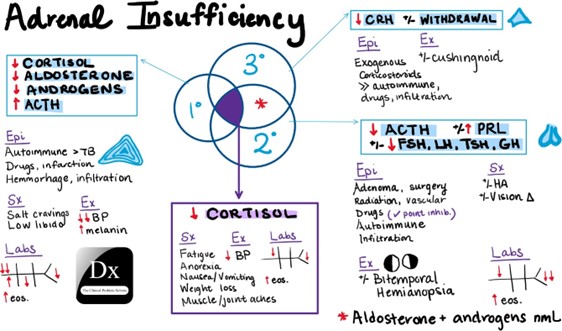A patient calls the clinic to report a new onset of severe diarrhea. What should the nurse anticipate that the patient will need to do?
Collect a stool specimen.
Have blood cultures drawn.
Prepare for colonoscopy.
Schedule a barium enema.
The Correct Answer is A
The nurse should anticipate that the patient will need to collect a stool specimen. Diarrhea can be caused by various factors such as infections, inflammatory bowel disease, food intolerance, and medication side effects. Collecting a stool specimen can help identify the underlying cause of the diarrhea and guide appropriate treatment. Blood cultures, colonoscopy but barium enema may be necessary in certain cases but are not typically the first step in the diagnostic process for diarrhea.
Nursing Test Bank
Naxlex Comprehensive Predictor Exams
Related Questions
Correct Answer is C
Explanation
The patient's vital signs suggest that she is experiencing hypotension, tachycardia, and possibly dehydration due to acute adrenal insufficiency. The highest priority nursing intervention for this patient is to provide isotonic fluids to restore intravascular volume and blood pressure. This will also help to correct any electrolyte imbalances that may be present. Administering furosemide (Lasix) or replacing potassium losses may be necessary interventions, but they are not the highest priority at this time. Restricting sodium would be contraindicated in this situation as the patient is hypotensive and needs fluids to increase intravascular volume.

Correct Answer is D
Explanation
Therefore, the correct option is d. Glyburide is a sulfonylurea medication used to treat type 2 diabetes. It works by stimulating the beta cells in the pancreas to produce and release more insulin, which helps to lower blood glucose levels.
Option A is incorrect because glyburide does not affect glucagon secretion from the pancreas. Glucagon is a hormone that raises blood glucose levels by promoting the breakdown of glycogen in the liver.
Option b is incorrect because glyburide should not be taken if the morning blood glucose level is less than 70 mg/dL, as this may increase the risk of hypoglycemia.
Option c is incorrect because glyburide does not interact with IV contrast media. However, some types of IV contrast media can cause kidney damage in patients with diabetes, and the use of glyburide should be temporarily discontinued if a patient is undergoing a procedure that involves the use of contrast media.
Whether you are a student looking to ace your exams or a practicing nurse seeking to enhance your expertise , our nursing education contents will empower you with the confidence and competence to make a difference in the lives of patients and become a respected leader in the healthcare field.
Visit Naxlex, invest in your future and unlock endless possibilities with our unparalleled nursing education contents today
Report Wrong Answer on the Current Question
Do you disagree with the answer? If yes, what is your expected answer? Explain.
Kindly be descriptive with the issue you are facing.
